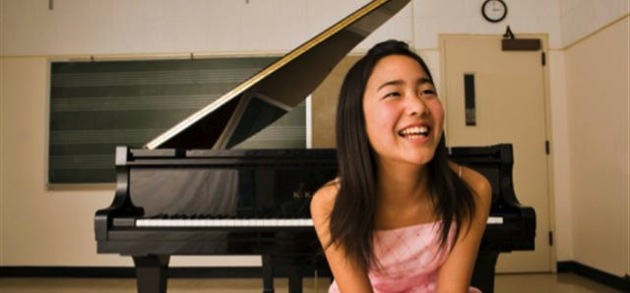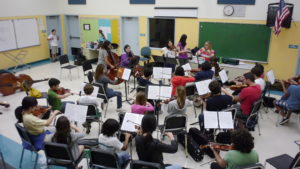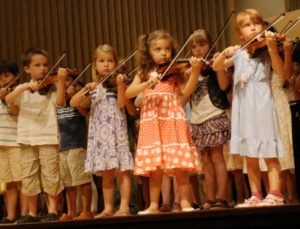Many students across North America are starting to realize that it takes more than just good grades in high school to be successful after high school. Extracurricular activities are almost necessary nowadays when it comes to being accepted into colleges, and knowing important skills and facts that school cannot necessarily teach you is essential to being successful in life. Athletics is the extracurricular activity of choice for many students in the United States and Canada, and there are many college scholarships that can be awarded for playing and succeeding in a sport during high school.
Another option that is just as prevalent but is not as well known is music, but music is not something that is pursued by many students. There is a stigma that surrounds school activities, and it states that doing sports is cool, and being in the band is not cool. Though “cool” and “uncool” is irrelevant (and completely wrong), music can offer college scholarship opportunities, and it can also teach a variety of life skills that are applicable to college, the workplace, and to everyday life. Through this blog, I can hopefully enlighten you, if only a little bit, about the benefits of having music be a part of your high school experience.
Music Teaches Discipline and that Hard Work Pays Off
Music is a tangible way for students to learn that the act of practicing something really does yield results, and it helps to develop the discipline that is necessary to practice regularly. In other words, students can learn for themselves that practicing consistently will improve their skills. Practicing in music is relatively straightforward and simple due to its mechanical nature; the ability to produce music ultimately boils down to the ability to move your muscles in the correct way. As a result, you will learn that the only way to improve is to work hard and to regularly train your muscles. For example, one of the obvious differences between a beginning piano player and a professional piano player is the speed and precision at which the professionals are able to move their fingers.

This characteristic of music also makes it easy for students to identify what they need to do in order to improve. Practicing will eventually become less frustrating since you do not have to waste time trying different methods to improve; through continuous practice, you will learn which method works best for them. This, in turn, will increase your motivation and your practicing time and what does practice lead to? Results! Being able to see your hard work paying off is empowering and will actually discipline you to continue practicing and improving. Visualize this for me: a particularly difficult piece of music that suddenly seems much easier to play. You may find that your fingers are suddenly able to move fast enough for that run, or you might find that you are finally playing a scale with the right rhythm. These achievements teach you that practicing regularly works and that working harder can quickly lead to results.
How do these traits transfer to doing well in college? Well, I can’t think of a single person who would actually want to spend countless nights up until the wee hours of the morning finishing assignments. The harder you work and the more practice you are able to get when it comes to doing homework efficiently and on time, the easier experience you will have. It’s as simple as that!
Music Teaches Teamwork
In a high school environment, music is not often created alone; rather, it is performed in bands, groups, choirs, and/or ensembles. More often than not, you will be one of many trumpet players in the school band, or one of the many alto’s in the school choir. You will be playing or singing the very same part as a number of other people and in order to make good music, everyone in the same section must work together to sound as one. This involves listening to, communicating with, and respecting each other, and all of these components are essential to good teamwork. 
In addition to being a part of a section, you are also a part of the larger ensemble. This means that you will learn the importance of working as a team with not only the smaller section, but also the larger group. For example, you and the other trumpeters might be playing at the same time together, but none of you will benefit the whole group if you are playing when you are not supposed to be playing. You can try to apply this concept later on in life, perhaps in the workplace when you are older. While it is important to have a good relationship between coworkers in the same department, it is also equally as important to have good connections to other departments in the company. One bad apple can ruin the whole bunch, and learning components of good teamwork through music can be incredibly beneficial to you.
Music Teaches Responsibility, Dedication, and Commitment
When you are part of a group of thirty or more people, responsibility, dedication, and commitment are important traits to possess. Taking part in musical activities is a way to foster the growth of these traits, and a good and very simple example of this is the small act of taking care of an instrument; you will quickly learn a form of responsibility when regularly caring for an instrument. Good care and maintenance of an instrument is important to maintaining a good sound quality and to preventing damage that would otherwise lead to costly repairs (and as a student, you don’t want to have to find a way to afford those repairs!). An example of this kind of responsibility: you would be responsible for putting your instrument back in the case properly after each session, and for wiping away any excess moisture every time the instrument is used to prevent bacterial growth and decay.
Responsibility towards other people is also learned in music, and this skill is one that is transferrable to any aspect of life. You must take the responsibility to learn your own part on your own time so that the entire ensemble as a whole does not suffer. What does it take to make yourself learn your part on your own time, on time for rehearsals? Commitment and dedication. Practicing, which usually results from the instinct to simply not look bad, eventually becomes a way to ensure that you do not let anyone else down. This desire to do well for everyone provides a good way for students to learn and to appreciate the ability to commit to something. Involved students, through a sense of belonging and responsibility, commit themselves to the success of the group by dedicating themselves to practicing at home and taking the responsibility upon themselves to do well as a part of the group.
How do these traits transfer to doing well in college? Do you know how much responsibility, dedication, and commitment it takes to be a successful college student? No? Well let me tell you, it’s a lot. A LOT. You are responsible for ensuring that your own work is complete on time – no one is going to remind you in college. You need to have the dedication to do all of those long, tedious readings night after night, and as far as commitment goes… well, proving that you can stay committed to an extracurricular activity such as music will simultaneously prove that you can stay committed to an average of four years at college.
Music Teaches Punctuality and Reliability
 One of the first words that comes to mind when thinking of music is the word “concert”. Concerts and performances are a musician’s chance to show off all the hard work that has been put into a particular piece of music. If you are going to perform at a concert, you obviously need to make sure that you do not miss that concert. You will need to make sure to arrive at the correct venue on the correct date sufficiently before the set show time. The concept of punctuality is very important – even one minute could mean the difference between an amazing performance and one that resembles fingernails on a chalkboard. In music, students are introduced to the importance punctuality in a very straightforward way: the later you are to rehearsal, the less time you have to spend as a group and the worse your performance will be. It is therefore in your best interest to be punctual!
One of the first words that comes to mind when thinking of music is the word “concert”. Concerts and performances are a musician’s chance to show off all the hard work that has been put into a particular piece of music. If you are going to perform at a concert, you obviously need to make sure that you do not miss that concert. You will need to make sure to arrive at the correct venue on the correct date sufficiently before the set show time. The concept of punctuality is very important – even one minute could mean the difference between an amazing performance and one that resembles fingernails on a chalkboard. In music, students are introduced to the importance punctuality in a very straightforward way: the later you are to rehearsal, the less time you have to spend as a group and the worse your performance will be. It is therefore in your best interest to be punctual!
Music also teaches the concept of reliability, which is sometimes forgotten by the youth of today: it is not enough just to show up on time. As bad as it is to be late, it is worse to be unprepared. If you are late but you know your part well, the group can start without you and you can join in later without too much trouble. However, if you are early for rehearsal but you do not adequately know your part, you will end up wasting more time than you would if you were late. Reliability can also make for a good reputation and is a good trait to take with you into the workforce. I will just be frank about this one: you will not last long in a workplace environment if you cannot be relied upon for even the simplest of things. Ultimately, it is just as important to be reliable as it is to be punctual when it comes to being successful in music and in any of your future endeavors.
How do these traits transfer to doing well in college? Well, by making sure that you not only hand in your assignments on time, but also that you actually get to class on time. Colleges won’t want to accept someone only for that person to never hand in assignments on time or to never show up to classes. Also, group assignments and projects don’t necessarily stop just because high school is over. There will be times when you must work as a part of a group or in a partnership, and those people will need to be able to rely on you to do your share of the work.
Music Creates a Social Support System and is Fun
As with any group activity, music can create a sense of community that eventually transforms into a social support system. Students who enjoy music often become closer with their band or choir mates, which provides them a diverse network of friends to hang out with, to discuss homework with, and to practice musical numbers together. Having a group of people with whom you can practice or study can increase the motivation to practice or study. For example, it can be hard to stay motivated and practice for an hour if you are by yourself; however, if you have friends around, it is easier to keep practicing.
There is also a smaller chance of ignoring a set schedule if more people are aware of it, thus improving motivation and discipline to practice. In this case, peer pressure can be a useful force to encourage positive habits, such as punctuality and reliability.
Another large perk to music is that it is fun. School can sometimes become tedious, especially if you are not involved in any extracurricular activities that you can look forward to. Music is an exciting activity that can spark a sense of pride within yourself, whether it is because you have friends to see or because you enjoy the music that you are making.
Ways That YOU Can Become Involved In Music
The most common options for music at school include concert band, jazz band, ensembles (guitar and percussion, for example), concert choirs, single gender choirs, and acapella groups. Getting involved can be as easy as signing yourself up for a music course at school or joining a music group. If being a part of a music group at school isn’t your thing, you can also take private music lessons and audition for groups outside of school. The ways that you can get involved are endless, as long as you are willing to look for them!
Summary
For your convenience, I have listed some of the major points of this post here in point form:
- Music can teach you a variety of life skills that are not necessarily taught in school.
- You can learn discipline and that practicing regularly works.
- Music usually features groups of people and thus teaches teamwork and that all members of the team are important. You will learn to work with your immediate team, as well as the group as a whole.
- Music teaches responsibility, dedication, and commitment. You will learn to be committed to the success of the group and to dedicate time to practicing.
- Music teaches punctuality and reliability. You will learn that being on time to rehearsals and that being prepared for rehearsals are important to the overall success of the group.
- Music is fun and creates a social support system that fosters a sense of belonging. You can make friends through music and also enjoy what you are doing, which can make your entire school experience more fun for you.
- You can get involved in music at school by taking a course or by joining a school band or choir.
- If there is no music option at school, you can sign up for private lessons in town, or you can audition for community plays.
I hope that you find music to be a treat for not only your ears, but also for your future. Be it college, a job, or just life in general: take what you learn from having music in your life and allow it to prepare you and guide you for the rest of your life.
SchoolTutoring Academy is the premier educational services company for K-12 and college students. We offer tutoring programs for students in K-12, AP classes, and college. To learn more about how we help parents and students in Toronto, ON visit: Tutoring in Toronto, ON.




